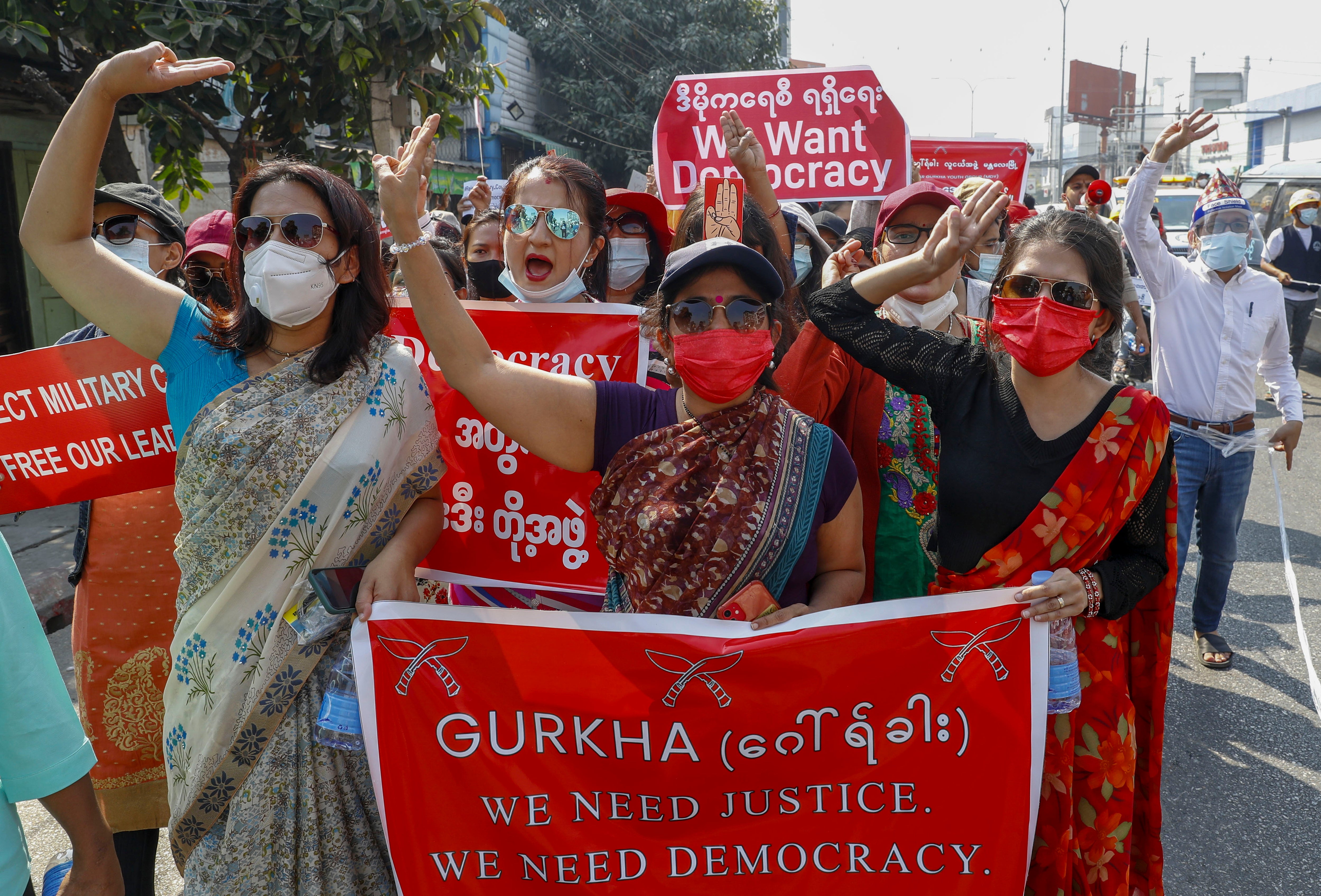Ethnic minorities join big crowds protesting Myanmar coup
Members of Myanmar’s myriad ethnic minorities marching behind their groups’ flags joined the large and enthusiastic protests against the junta that took over the government last week

Your support helps us to tell the story
From reproductive rights to climate change to Big Tech, The Independent is on the ground when the story is developing. Whether it's investigating the financials of Elon Musk's pro-Trump PAC or producing our latest documentary, 'The A Word', which shines a light on the American women fighting for reproductive rights, we know how important it is to parse out the facts from the messaging.
At such a critical moment in US history, we need reporters on the ground. Your donation allows us to keep sending journalists to speak to both sides of the story.
The Independent is trusted by Americans across the entire political spectrum. And unlike many other quality news outlets, we choose not to lock Americans out of our reporting and analysis with paywalls. We believe quality journalism should be available to everyone, paid for by those who can afford it.
Your support makes all the difference.Members of Myanmar’s myriad ethnic minorities marching behind their groups’ flags joined the large and enthusiastic protests Thursday against the junta that took over the government last week.
The resistance to the coup received a major boost from abroad from President Joe Biden who ordered new sanctions and promised more measures to come. “The military must relinquish power it seized and demonstrate respect for the will of the people," he said.
Tens of thousands of protesters, if not more, have marched daily in Yangon and Mandalay, the country’s biggest cities. Large rallies also have been taking place in the capital Naypyitaw and many other cities and towns.
Participants have included factory workers, civil servants, students and teachers, medical personnel and other people from all walks of life. Buddhist monks and Catholic clergy have been visible, as have LGBTQ contingents behind rainbow flags.
On Thursday in the southern city of Dawei, protesters wiped their feet and stamped on a poster of Senior Gen. Min Aung Hlaing, the much-scorned coup leader who now heads the ruling junta.
The protesters are demanding that power be restored to the elected government and detained party officials, including ousted national leader Aung San Suu Kyi, be freed. About 200 politicians and activists have been arrested, according to the independent Assistance Association for Political Prisoners.
The junta has shown no signs of backing down and on Wednesday night arrested more senior members of Suu Kyi’s National League for Democracy party, along with other politicians and activists. Also reported to have been taken from their homes were members of the state election commission who certified the landslide victory of Suu Kyi’s party in last November’s election.
The military based its Feb. 1 takeover on allegations the election was marred by irregularities, though the commission found no evidence to support them. The junta has formed a new commission to investigate the allegations and vows to turn over power to the winners of a new election after a one-year state of emergency.
The participation of ethnic minority marchers in Yangon, many dressed in the colorful traditional garb of their regions, underlined the depth and breadth of the opposition to last week’s coup.
While much attention has focused on protests in Myanmar's major heartland cities, large daily protests have also taken place in the far-flung border areas home to minorities such as the Shan, the Karen, the Kachin, the Kayah and others. Ethnic minorities have long been the targets of repression by the military, which has used brutal counterinsurgency tactics to crush their decades-long aspirations for greater autonomy.
But the military has not hesitated to employ force in big cities either. Juntas ruled directly for five decades after a 1962 coup, and used lethal force to quash a massive 1988 uprising and a 2007 revolt led by Buddhist monks.
International sanctions long were employed by Western governments in reaction to those crackdowns, but they were eased when elections in 2010 and 2015 showed the country's tentative steps toward democracy.
At the White House on Wednesday, Biden said he was issuing an executive order that will prevent Myanmar’s generals from accessing $1 billion in assets in the United States.
It remains to be seen what, if any, impact the U.S. action will have on Myanmar’s military regime. Many of the military leaders are already under sanctions because of attacks against the Muslim Rohingya minority.